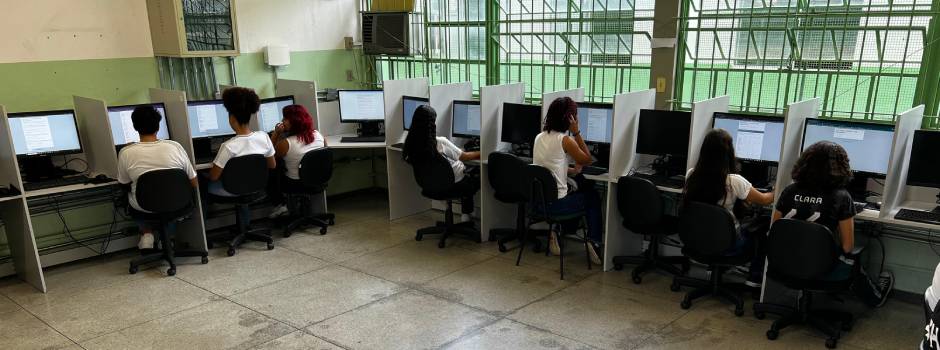The State Department of Education of Minas Gerais (SEE/MG) launched this Thursday (8/2) a survey to evaluate the school environment of the state educational network, listening to students, teachers and administrators. The research is part of the Socio-Emotional Project, an unprecedented initiative by the Government of Minas Gerais aimed at the school community’s perceptions and opinions on coexistence, interpersonal relationships, learning conditions and the overall school environment.
This School Climate Listening Questionnaire is the first action of the project and will allow SEE/MG to gather evidence and conduct research that will enable the building of new indicators for the network in the future.
Undersecretary for Basic Education Development Kellen Senra says the research is in collaboration with several institutions that study the subject of education and essential mechanisms for improving the school environment.
“We thought of something that could listen to our professionals and students, assess the environment and guide actions to strengthen the pedagogical management between cognitive and social-emotional aspects. The questionnaire is an instrument developed and validated by a group of researchers from several universities and the Moral Education Study and Research Group (Gepem), with the support of the State Research Support Fund of São Paulo (Fapesp) and the Lemann Foundation, explains.
Application of research
In this initial phase of the project, the survey will be conducted until February 29 in public schools. SEE/MG aims to hear from approximately 400,000 students and approximately 20,000 civil servants, a figure that represents 80% of the survey sample, both teachers and students.
At this first moment, the listening questionnaire on school climate will be applied on a sample basis to students of 7th year of primary school, 2nd and 3rd year of high school, managers and teachers of physical education, history, science or biology, Mathematics or Portuguese language.
Research pilot
The first questionnaires were distributed to the leaders, teachers and students of Getulio Vargas Public School in Belo Horizonte. In an online format, it consists of around 120 questions that address various topics such as relationships with teaching and learning, social relations and conflicts at school, rules, sanctions and safety at school, family, school and community, work relationships and situations. bullying among students, among other issues related to the context of everyday school life.
To lead and guide the school team in this first experience, SEE/MG technicians were in the teaching department where a mock test was conducted. “We are listening to a sample of professionals and students, and at this point it is very important to involve everyone who is the target audience for this research. We will consider actions consistent with our network that are consistent with the goals of the Social-Emotional Project and our interests, continuing to provide quality teaching and protect the educational rights of our students,” details the SEE/MG Superintendent of Educational Policy. Graziela Trindade, who was in the teaching department at the time.
Student Renan Martins Olavo de Souza, 3rd year at EE Getúlio Vargas High School, evaluated the experience of participating in the research as a positive one. “Research is very important to me because we share our feelings and will contribute to the next generations who will study in public schools. The questions are very related to the context of the school,” he commented.
A second moment of listening is planned for March, using questionnaires on the socio-emotional state of students and professionals in the network.
After implementing the Social-Emotional Questionnaire, SEE/MG will have mapping and data to guide action for the Social-Emotional Project, offering training and pedagogical activities to develop skills, prioritizing self-management, self-care, self-awareness, empathy, collaboration, and autonomy.
About questionnaires
The questionnaire aims to collect data and evidence about the school climate, enabling the discovery of reality with greater vulnerability. Answers to questionnaires are personal and anonymous. All information collected will be kept confidential.
There are three models of the school climate questionnaire. In the first, aimed at school leaders, participation is mandatory. This questionnaire contains specific topics developed in collaboration with the SEE/MG partner, the Military Police of Minas Gerais (PMMG), taking into account aspects related to security and crime prevention. These are such questions as: “Is there an educational program conducted by the military police in the school that includes visits to the school department?”
The responses will support SEE/MG and PMMG to develop activities already developed in educational programs and to support the safety of the school community.
Other models are optional for both teachers and students. Although optional, this participation is essential to understand the reality and therefore to improve the working and learning conditions in the network schools.
“We will be able to measure the perception of school actors on various aspects related to the school environment. From this questionnaire we will understand how they perceive the schools and their environment, both students and students and the coexistence between students and teachers, the management vision, the essential thing that will support the internal operations of the technical areas that are involved. this project,” emphasized SEE/MG’s Superintendent of Educational Evaluation, Wagner Costa.
In the second phase of the project, training will be carried out with the pedagogical team. From this course, actions aimed at improving the school environment and coexistence among students will be implemented.
Social-emotional project
The Social-Emotional Project was launched this year to strengthen pedagogical management between cognitive and social-emotional aspects to guide instructional work on practices and attitudes that develop and consolidate learners’ social-emotional skills and abilities.
The Sub-Secretariat of Basic Education Development of SEE/MG created the project to accompany teaching-learning activities aimed at improving coexistence among students, reducing situations such as bullying and violence at school. The initiative brings a perspective of dialogue, respect, compassion, inclusiveness and friendship aimed at improving the school environment.

